普通高中高二英语11月月考试题01201712210219
- 格式:doc
- 大小:148.15 KB
- 文档页数:12
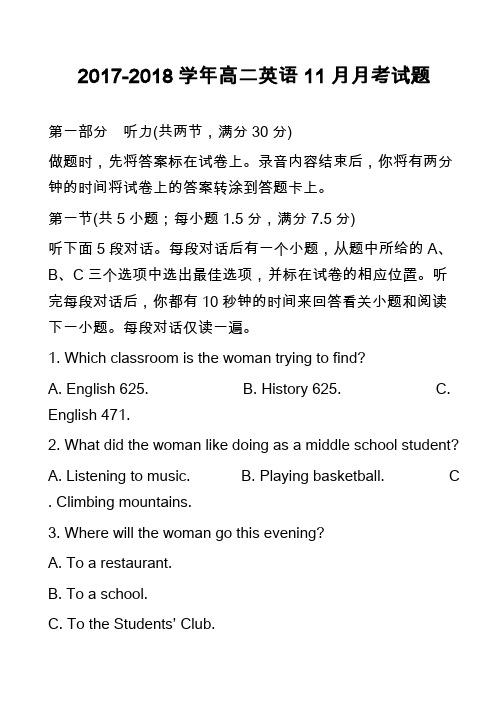
2017-2018学年高二英语11月月考试题第一部分听力(共两节,满分30分)做题时,先将答案标在试卷上。
录音内容结束后,你将有两分钟的时间将试卷上的答案转涂到答题卡上。
第一节(共5小题;每小题1.5分,满分7.5分)听下面5段对话。
每段对话后有一个小题,从题中所给的A、B、C三个选项中选出最佳选项,并标在试卷的相应位置。
听完每段对话后,你都有10秒钟的时间来回答看关小题和阅读下一小题。
每段对话仅读一遍。
1. Which classroom is the woman trying to find?A. English 625.B. History 625.C. English 471.2. What did the woman like doing as a middle school student?A. Listening to music.B. Playing basketball. C . Climbing mountains.3. Where will the woman go this evening?A. To a restaurant.B. To a school.C. To the Students’ Club.4. How would the woman like to spend her winter vacation?A. She will have a rest at home.B. She will visit her uncle.C. She will travel to London.5. What are the two speakers mainly talking about?A. How the boy prepared for the exam.B. When the boy finished his book report.C. Why the boy went to bed late last night.第二节 (共 15 小题;每小题 1.5 分,满分 22.5 分)听下面5段对话或独白。
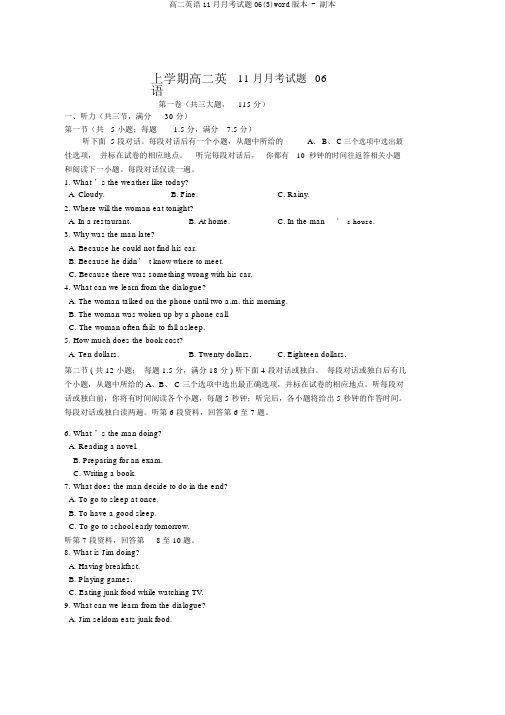
上学期高二英11 月月考试题06语第一卷(共三大题,115 分)一、听力(共三节,满分30 分)第一节(共 5 小题;每题 1.5 分,满分7.5 分)听下面 5 段对话。
每段对话后有一个小题,从题中所给的A、 B、 C 三个选项中选出最佳选项,并标在试卷的相应地点。
听完每段对话后,你都有10秒钟的时间往返答相关小题和阅读下一小题。
每段对话仅读一遍。
1. What ’s the weather like today?A. Cloudy.B. Fine.C. Rainy.2. Where will the woman eat tonight?A. In a restaurant.B. At home.C. In the man’ s house.3.Why was the man late?A.Because he could not find his car.B.Because he didn’ t know where to meet.C.Because there was something wrong with his car.4.What can we learn from the dialogue?A.The woman talked on the phone until two a.m. this morning.B.The woman was woken up by a phone call.C.The woman often fails to fall asleep.5.How much does the book cost?A. Ten dollars.B. Twenty dollars.C. Eighteen dollars.第二节 ( 共 12 小题;每题 1.5 分,满分 18 分 ) 听下面 4 段对话或独白。
每段对话或独白后有几个小题,从题中所给的 A、B、 C 三个选项中选出最正确选项,并标在试卷的相应地点。
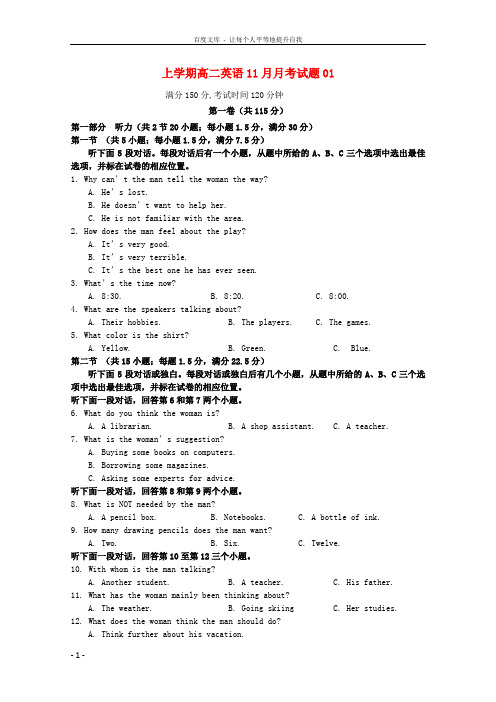
上学期高二英语11月月考试题01满分150分,考试时间120分钟第一卷(共115分)第一部分听力(共2节20小题;每小题1.5分,满分30分)第一节(共5小题;每小题1.5分,满分7.5分)听下面5段对话。
每段对话后有一个小题,从题中所给的A、B、C三个选项中选出最佳选项,并标在试卷的相应位置。
1. Why can’t the man tell the woman the way?A. He’s lost.B. He doesn’t want to help her.C. He is not familiar with the area.2. How does the man feel about the play?A. It’s very good.B. It’s very terrible.C. It’s the best one he has ever seen.3. What’s the time now?A. 8:30.B. 8:20.C. 8:00.4. What are the speakers talking about?A. Their hobbies.B. The players.C. The games.5. What color is the shirt?A. Yellow.B. Green.C. Blue.第二节(共15小题;每题1.5分,满分22.5分)听下面5段对话或独白。
每段对话或独白后有几个小题,从题中所给的A、B、C三个选项中选出最佳选项,并标在试卷的相应位置。
听下面一段对话,回答第6和第7两个小题。
6. What do you think the woman is?A. A librarian.B. A shop assistant.C. A teacher.7. What is the woman’s suggestion?A. Buying some books on computers.B. Borrowing some magazines.C. Asking some experts for advice.听下面一段对话,回答第8和第9两个小题。
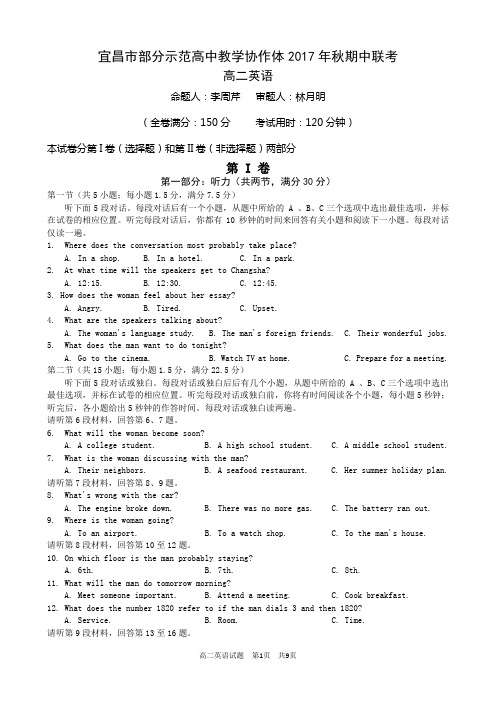
宜昌市部分示范高中教学协作体2017年秋期中联考高二英语命题人:李周芹审题人:林月明(全卷满分:150分考试用时:120分钟)本试卷分第I卷(选择题)和第II卷(非选择题)两部分第 I 卷第一部分:听力(共两节,满分30分)第一节(共5小题;每小题1.5分,满分7.5分)听下面5段对话。
每段对话后有一个小题,从题中所给的 A 、B、C三个选项中选出最佳选项,并标在试卷的相应位置。
听完每段对话后,你都有10秒钟的时间来回答有关小题和阅读下一小题。
每段对话仅读一遍。
1. Where does the conversation most probably take place?A. In a shop.B. In a hotel.C. In a park.2. At what time will the speakers get to Changsha?A. 12:15.B. 12:30.C. 12:45.3. How does the woman feel about her essay?A. Angry.B. Tired.C. Upset.4. What are the speakers talking about?A. The woman's language study.B. The man's foreign friends.C. Their wonderful jobs.5. What does the man want to do tonight?A. Go to the cinema.B. Watch TV at home.C. Prepare for a meeting. 第二节(共15小题;每小题1.5分,满分22.5分)听下面5段对话或独白。
每段对话或独白后后有几个小题,从题中所给的 A 、B、C三个选项中选出最佳选项,并标在试卷的相应位置。
听完每段对话或独白前,你将有时间阅读各个小题,每小题5秒钟;听完后,各小题给出5秒钟的作答时间。
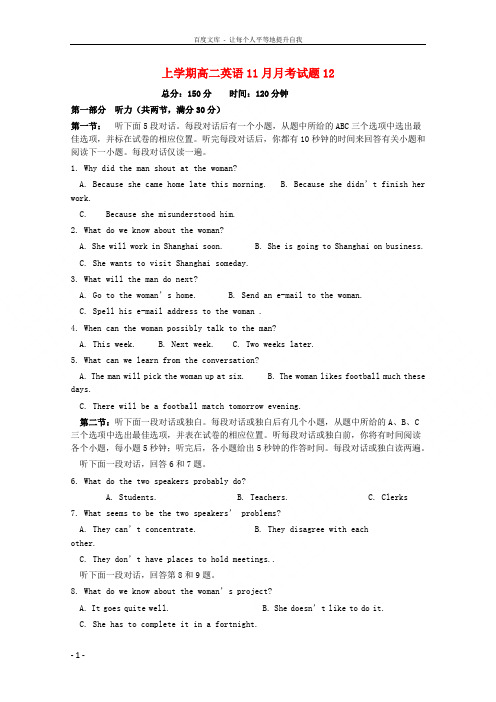
上学期高二英语11月月考试题12总分:150分时间:120分钟第一部分听力(共两节,满分30分)第一节:听下面5段对话。
每段对话后有一个小题,从题中所给的ABC三个选项中选出最佳选项,并标在试卷的相应位置。
听完每段对话后,你都有10秒钟的时间来回答有关小题和阅读下一小题。
每段对话仅读一遍。
1. Why did the man shout at the woman?A. Because she came home late this morning.B. Because she d idn’t finish her work.C. Because she misunderstood him.2. What do we know about the woman?A. She will work in Shanghai soon.B. She is going to Shanghai on business.C. She wants to visit Shanghai someday.3. What will the man do next?A. Go to the woman’s home.B. Send an e-mail to the woman.C. Spell his e-mail address to the woman .4. When can the woman possibly talk to the man?A. This week.B. Next week.C. Two weeks later.5. What can we learn from the conversation?A. The man will pick the woman up at six.B. The woman likes football much these days.C. There will be a football match tomorrow evening.第二节:听下面一段对话或独白。
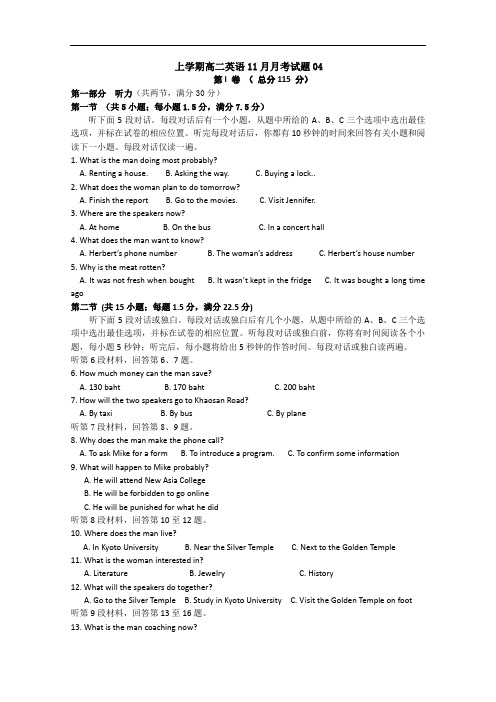
上学期高二英语11月月考试题04第I 卷(总分115 分)第一部分听力(共两节,满分30分)第一节(共5小题;每小题1.5分,满分7.5分)听下面5段对话。
每段对话后有一个小题,从题中所给的A、B、C三个选项中选出最佳选项,并标在试卷的相应位置。
听完每段对话后,你都有10秒钟的时间来回答有关小题和阅读下一小题。
每段对话仅读一遍。
1. What is the man doing most probably?A. Renting a house.B. Asking the way.C. Buying a lock..2. What does the woman plan to do tomorrow?A. Finish the reportB. Go to the movies.C. Visit Jennifer.3. Where are the speakers now?A. At homeB. On the busC. In a concert hall4. What does the man want to know?A. Herbert’s phone numberB. The woman’s addressC. Herbert’s house number5. Why is the meat rotten?A. It was not fresh when boughtB. It wasn’t kept in the fridgeC. It was bought a long time ago第二节(共15小题;每题1.5分,满分22.5分)听下面5段对话或独白。
每段对话或独白后有几个小题,从题中所给的A、B、C三个选项中选出最佳选项,并标在试卷的相应位置。
听每段对话或独白前,你将有时间阅读各个小题,每小题5秒钟;听完后,每小题将给出5秒钟的作答时间。
每段对话或独白读两遍。
听第6段材料,回答第6、7题。
上学期高二英语11月月考试题04第I 卷(总分115 分)第一部分听力(共两节,满分30分)第一节(共5小题;每小题1.5分,满分7.5分)听下面5段对话。
每段对话后有一个小题,从题中所给的A、B、C三个选项中选出最佳选项,并标在试卷的相应位置。
听完每段对话后,你都有10秒钟的时间来回答有关小题和阅读下一小题。
每段对话仅读一遍。
1. What is the man doing most probably?A. Renting a house.B. Asking the way.C. Buying a lock..2. What does the woman plan to do tomorrow?A. Finish the reportB. Go to the movies.C. Visit Jennifer.3. Where are the speakers now?A. At homeB. On the busC. In a concert hall4. What does the man want to know?A. Herbert’s phone numberB. The woman’s addressC. Herbert’s house number5. Why is the meat rotten?A. It was not fresh when boughtB. It wasn’t kept in the fridgeC. It was bought a long time ago第二节(共15小题;每题1.5分,满分22.5分)听下面5段对话或独白。
每段对话或独白后有几个小题,从题中所给的A、B、C三个选项中选出最佳选项,并标在试卷的相应位置。
听每段对话或独白前,你将有时间阅读各个小题,每小题5秒钟;听完后,每小题将给出5秒钟的作答时间。
每段对话或独白读两遍。
听第6段材料,回答第6、7题。
2024北京人大附中高二11月统练英语考试时间:60分钟满分:100分注意:请将Ⅱ卷答案写在答题纸上,请将Ⅰ卷答案填涂到机读卡上。
Ⅰ卷一、完形填空(共10小题;每小题1.5分,共15分)When I was three, I had a very good friend named Gemma. She was fearless where I was anxious, 1 where I was conservative and skillful where I was clumsy. She was also entirely imaginary.I can’t remember when or how I “met” Gemma, and, perhaps sadder still, I don’t remember the last time I “saw” her. Even though my brain created her, she 2 me to go on adventures I would not have had the confidence to embark upon without her. So it saddened me to see the results of a recent survey showing 72% of nursery workers believed children have fewer 3 friends than they did five years ago, with 63% believing this to be a result of increased screen time.It’s thought that 40% of us had imaginary friends during our 4 . In an essay, the researchers found that81% of those surveyed had “lost” their imaginary friends after they turned 10, but most of these friendships ended 5 . Perhaps imaginary friends simply stay with us for as long as we need them, moving on when our lives become too full and loaded for our brains to make space to generate their own 6 .If you’ve enjoyed an imaginary friendship, I’d guess that you did not consciously sit down to create a perfect pal - they probably arrived 7 . as an indication of thoughts and ideas you never knew you had. Our imaginary friends prompt us to explore and honour our curiosity. It is very hard to make the time and the space to do this as an adult. In order to be a good 8 to an imaginary friend, you need to be able to make “what if?” into an exciting plan. When we grow up, we’re too quick to finish the sentence with, “what if it goes wrong?”As an adult, we might not still need imaginary friends, but maybe we need to be reminded that a little bit of 9 is good for us, and that our brains can conjure up(想起)the best ideas when they are left to their own devices. If there are fewer imaginary friends populating the worlds that our children live in, that might lead to a future with fewer artists, writers and problem-solvers, which is a real cause for 10 .1. A. adaptable B. rebellious C. emotional D. considerate2. A. adjusted B. retrained C. innovated D. inspired3. A. imaginary B. intimate C. decent D. intelligent4. A. adulthood B. adolescence C. childhood D. babyhood5. A. evidently B. naturally C. occasionally D. suddenly6. A. association B. education C. occupation D. creation7. A. unheard B. unasked C. untouched D. untold8. A. companion B. instructor C. student D. assistant9. A. freedom B. wisdom C. boredom D. random10. A. imagination B. concern C. limitation D. failure二、阅读理解(共16小题;每小题2分,共32分)AIt is our mission to help busy but curious home cooks make the best purchase decisions. Now compile our informative lists below.KitchnIf you’re dedicated to learning the ins and outs of cooking and want a full program, Kitchn Cooking School offers an online course that includes 20 lessons over 20 days for only $30 each class.Each day, a new topic is covered, starting with knife skills and ending with how to plan, cook and throw a dinner party. Most importantly, the instructors value the joy in cooking. The tone of Kitchn is light, playful, and fun, but still professional and very informative.UdemyWith over 183,000 online courses available, Udemy offers a variety of cooking courses taught by instructors around the country.Many videos come with bonus material that includes suggestions on kitchen tools and equipment. Udemy offers great deals with large sales on classes, as well as a selection of free content. Courses come with full, lifetime access when purchased and a 30-day, money-back guarantee. Prices generally range from $10 to $30.RouxbeWidely recognized as the leading online cooking school among industry professionals, Rouxbe offers a wide array of individual lessons, plus their professional certificate programs.Membership costs around $15 per month or $99 per year, but Rouxbe often offers discounts on their annual membership, as well as a 30-day free trial. So, if you’ve been struggling to come up with recipes to cook at home, Rouxbe is a fantastic resource that provides simple, quality professional guidance.NYTNYT is recognized for its food section and offers a large selection of instructional cooking videos online for all skill levels.For those with specific dietary preferences, you can easily find what you’re looking for by selecting categories like dairy-free, low-carb, high fiber and more. Membership fee is around $5 per month or $40 annually for unlimited access. And, not to worry: You can cancel at any time.11. Which one is most likely to attract vegetarians?A. Kitchn.B. NYT.C. Rouxbe.D. Udemy.12. What can we know from the passage?A. Rouxbe is highly thought of by industry professionals.B. Kitchn is recognized for its professional and informative style.C. NYT targets people with specific dietary preferences.D. Udemy offers rich cooking courses by worldwide instructors.13. What is the purpose of the passage?A. To introduce cooking.B. To compare the cooking methods.C. To promote home cooking skills.D. To recommend cooking schools.BJokes and humor are often thought of as unimportant things. If the lawyer defending you in court couldn’t stop joking, you’d be understandably alarmed.However, regarding humour as insignificance is a mistake. Humour, jokes and laughter, have a vital role to play in human behaviour and interaction. They are a powerful part of social bonding and are genuinely beneficial for health via their stress-relieving properties.Why do we respond, in such powerful and rewarding ways, to things that objectively make little sense? A substantial amount of data has been generated regarding how humour works in the brain and on the various types of recognizable jokes that trigger it.Verbal puns, the most familiar type of joke, involve words that convey two meanings at once. For example, “Why did the golfer wear two pairs of trousers? In case he got a hole in one.” Here “hole in one” has two possible interpretations. Their simplicity and familiarity mean most people recognize the humour in puns. So, the brain’s humour processes are still engaged.But where does humour arise from in the brain? Considerable research points towards a specific system in the brain for recognizing humour. This system seemingly detects and resolves incongruity(不和谐). Our brains know how things, like language and behaviors, should work. But, in the real world, many things don’t match our expectations. It seems our brains have evolved a system to recognize when this happens.If normality is subverted, it means we don’t know what’s going to happen, which creates cognitive(认知)tension. However, the system that recognizes incongruity seemingly also resolves it, by providing an explanation, or at least a confirmation that the incongruity has no negative consequences. This removes the uncertainty, relieving the tension. So, we experience a rewarding feeling. If the incongruity is not resolved, however, humour is absent. If the answer to “Why did the golfer wear two pairs of trousers?” is “in case the metal owl that lives in his gold bag attacks him”, that’s not funny. There’s unresolved incongruity.Humour is essentially our brain going, “This isn’t how things usually work, but I’m okay with it!”14. What does the author say about humor in the first two paragraphs?A. It mainly serves to entertain and amuse.B. It is essential for professional communication.C. Its harmful effects shouldn’t be ignored.D. Its positive role is often underrated.15. Why does the author mention the “hole in one” example in paragraph 4?A. To prove a theory.B. To draw a conclusion.C. To make a comparison.D. To illustrate a concept.16. What does the underlined word “subverted” in paragraph 6 probably mean?A. Overturned.B. Repeated.C. Established.D. Detected.17. What is the best title for the text?A. Jokes and the Brain’s Reward SystemB. Using Humor to Boost Brain PowerC. Unlocking Brain Secrets Behind HumorD. How Jokes Affect Brain StructuresCLia Thomas, a student at the University of Pennsylvania, is an excellent swimmer. She often beats her rivals by tens of seconds, breaking records. Her success is based on three things. One is natural talent. Another is persistent training. And the third is biology.For although she identifies as a woman, Ms Thomas was born male. Since humans cannot change their sex (unlike their self-identified gender), she remains that way. On the eve of her biggest competition, Ms Thomas finds herself at the centre of the bad-tempered debate about whether trans women— males who identify as women— should compete in women’s sports. That, in turn, is part of a broader argument: should brute(纯粹的)biological facts sometimes override people’s deeply held feelings about their identities?This newspaper believes it is almost always unfair to allow transgender women to compete in women’s sports. The advantages bestowed by male puberty(青春期)are so big that no amount of training or talent can enable female athletes to overcome them. Florence Griffith Joyner’s 100-metres world sprinting record has stood for three decades. A male matching it would not even make it to the Olympics, let alone the final. In 2016, at an American event for high-schoolers, four of the eight boys in the 100-metres final ran faster.Much of the male advantage is granted by testosterone(睾丸素), a potent anabolic steroid whose levels rise sharply in male puberty. For many years, many sporting bodies, following the lead of the International Olympic Committee, hoped to deal with the issue by allowing trans women to compete in women’s events provided they took testosterone-suppressing drugs. But the science suggests this does not level the playing field. Suppressing testosterone in adults, it seems, does little to undo the advantages granted by a male adolescence.Sports must therefore choose between inclusion and fairness; and they should choose fair play. That does not mean, as is sometimes claimed, that trans women would be barred from all sport. One way to make that clear would be to replace the “men’s” and “women’s” categories with “open” and “female” ones. The first would be open to all comers. The second would be restricted on the basis of biology.Sport is public, and results can be measured objectively. That means the argument that the material facts of biology should sometimes outrank a person’s subjective sense of identity is easier to make. But bias exists, as a Republican bill in Florida to restrict “instruction” in schools about gender identity or sexual orientation makes plain. That should be resisted.Most of the time, it costs little or nothing to respect people’s choices about how they wish to present themselves. In the rare cases where rights clash(不相容), society must weigh the balance sensitively and with open eyes.18. The author mentions Joyner’s 100-metres world sprinting record to show that ________.A. most female athletes can’t rival trans women athletesB. male puberty is the best time for sports competitionC. it is unfair for Ms Thomas to compete in women’s sportsD. this record can’t make a male reach the threshold of the Olympics19. What does the underlined word “that” in the passage refer to?A. billB. instructionC. biasD. identity20. What is the author’s attitude towards trans people in sports competition?A. disagreeableB. open-mindedC. sym patheticD. conservative21. Which might be the best title for the passage?A. Inclusion and FairnessB. Respect People’s ChoicesC. “Open” and “Female” in SportsD. Biology Matters A Great DealDThe Importance of ListeningGood communicators know the value of listening. They will tell you that in communication listening is more important than even speaking. You learn it early in your education. If you do not listen to your teacher in the classroom and follow his lecture, you may make mistakes in your responses or will have to spend more time studying and understanding the same. 22Effective listening has several advantages. Speaking exhausts you, whereas listening enriches you. A speaker betrays both his knowledge and ignorance, while a listener remains mysterious and eludes others’ judgment. When you listen attentively, you increase your knowledge of people and situations and your chances of becoming likable, friendly, and agreeable. People prefer being in the company of sympathetic listeners rather than garrulous speakers.23 Hence, they readily open their minds and hearts to those who are willing to listen to them.Thus, active listening is the foundation of any good conversation. If you want to be friendly with others and increase your zone of influence, you must listen to them most of the time and speak only when necessary. Those who always speak run the risk of attracting unwanted public attention and even ridicule, whereas good listeners quietly mingle with strangers and find new friends. 24 It helps you in teamwork, leadership, conflict resolution, negotiations, team building, and problem solving.25 It only means you have to pay attention, show respect and listen with concentration. By listening actively and paying attention, you can change the tone and tenor of any conversation. When you listen attentively, others feel comfortable in your presence and open their hearts and minds.Good listeners are enablers. They empower people. 26 When you listen attentively, you can observe and understand others and develop a better insight into their behavior. When you speak your mind will be preoccupied with what you want to say next, whereas when you listen you have a better opportunity to relax, observe and stay with the moment.A. They want to be heard and understood, rather than lectured and dominated.B. Listening helps you to know others, gather information and build relationships.C. They facilitate conversation, promote understanding and diffuse tense situations.D. Actively listening can greatly improve the quality of your relationships and communication.E. Listening does not mean you have to agree with everything or submit to everyone’s opinion.F. Your listening habits are a part of your personality and a reflection of your beliefs and attitude.G. Unfortunately, most of us do not remember this simple virtue later in life and are carried away by the charms of speech.Ⅱ卷一、补全短文(共10小题;每小题1分,共10分)阅读下面的短文,从A—J中选择适当的短语补全意思并写在答题纸上。
行唐县第三中学、正定县第三中学、正定县第七中学2016—2017学年第一学期11月联考试卷高二英语分值:150 分时间:90分钟I 卷(选择题共80分)第一部分阅读理解(共两节,满分40 分)第一节(共15小题;每小题2分,满分30 分)阅读下列短文,从每题所给的四个选项(A、B、C、D)中,选出最佳选项,并在答题卡上将该项涂黑。
A"All work and no play makes Jack a dull boy" is a popular saying in the United States. Other countries have similar sayings. It is true that all of us need recreation. We cannot work all the time if we are going to keep good health and enjoy life.Everyone has his own way of relaxing. Perhaps the most popular way is to take part in sports. There are team sports, such as baseball, basketball, and football. There are individual sports, also, such as golf and swimming. In addition, hiking, fishing, skiing, and mountain climbing have a great attraction for people who like to be outdoors.Not everyone who enjoys sports events likes to take part in them. Many people prefer to be onlookers, either watching them on television, or listening to them on the radio. When there is an important baseball game or boxing match, it is almost impossible to get tickets; everyone wants to attend.Chess, card-playing, and dancing are forms of indoor recreation enjoyed by many people. It doesn't matter whether we play a fast game of ping-pong, concentrate over the bridge table, or go walking through the woods on a brisk autumn afternoon. It is important for everyone to relax from time to time and enjoy some forms of recreation.1.The underlined word "recreation"(paragraph 1)here means_______.A. walking and climbingB. form of play or amusementC. creating somethingD. joy and happiness2.According to the passage, perhaps the followings are our ordinary ways of relaxation forcommon people except______.A. listening to musicB. playing cardC. going out for fishingD. boxing match3.Which of the following statements is TRUE to the passage?A. The popular British saying mentioned in the passage has familiar doing in other countries.B. All of us need recreation in our lives if we cannot work all the time.C. Sometimes those who enjoy sports events like to take part in them, too.D. It is almost impossible for everyone who wants to watch an important baseball to get a ticket.BLast night around 2 am I didn’t finish my work and I felt a littl e hungry. I decided togo to a shop by my house to pick up a snack. As I decided to go, a thought came to my mind that I should not spend all the money on food. Instead, I would save some money for a person in need.On my way, as I walked towards the shop on the main street, I came across a homeless person sleeping on the road. As I passed him, I knew exactly what I was going to spend that money on. I said to myself, “This person is sleeping outside on the road in this cold weather. He needs care.” I wa nted to put a smile on his face, the first thing in the morning. I wanted to help him.I walked into the shop and bought one less packet of chips for myself so I could get biscuits for the homeless man. As I walked back, I passed him. I was a little scared because I had to put the biscuits right next to his pillow and not disturb his sleep. With slow steps, I managed to put the biscuits right next to him without making any sound. Then, I walked away.When I got home, I replayed the whole experience in my head. Though it was nothing big, the surprise to him and the fact that he might not have to spend money or search for food when he woke up in the morning made me happy.4. At first, the author decided to __________.A. go out to have a walkB. buy himself something to eatC. go on finishing his important workD. help a person who was sleeping on the road5. Why did the author buy one less packet of chips?A. He only had a little money.B. He also bought biscuits for himself.C. He didn’t need too many packets of chips.D. He wanted to buy biscuits for the homeless man.6. When the author put the biscuits next to the man, he was ______.A. quick and excitedB. very happy and calmC. careful and a little afraidD. very worried and frightened7. Which of the following would be the best title for this passage?A. A surprising breakfastB. A poor homeless manC. I have done a good deedD. Don’t go out alone at nightCAre you looking for some new and exciting places to take your kids to? Try some of these places:Visit art museums. They offer a variety of activities to excite your kids' interest. Many offer workshops for making hand-made pieces, traveling exhibits, book signings(签名) by children's favorite writers, and even musical performances and other arts.Head to a natural history museum. This is where kids can discover the past from dinosaur models to rock collections and pictures of stars in the sky. Also, ask what kind of workshops and educational programs are prepared for kids and any special events that are coming up.Go to a Youtheater. Look for one in your area offering plays for child and family visitors. Pre-show play shops are conducted by area artists and educators where kids can discover the secret about performing arts. Puppet (木偶) making and stage make-up are just a couple of the special offerings you might find.Try hands-on science. Visit one of the many hands-on science museums around the country. These science play-lands are great fun for kids and grown-ups alike. They'll keep your childmentally and physically active the whole day through while pushing buttons, experimenting, and building.. When everyone is tired, enjoy a fun family science show, commonly found in these museums.8. If a child is interested in the universe, he probably will visitA. a YoutheaterB. an art museum-C. a natural history museumD. a hands-on science museum9. What can kids do at a Youtheater?A. Look at rock collections.B. See dinosaur models.C. Watch puppet making.D. Give performances.10. What does "hands-on science" mean in the last paragraph?A. Science games designed by kids.B. Learning science by doing things.C. A show of kids' science work.D. Reading science books.11. Where does this text probably come from?A. A science textbook.B. A tourist map.C. A museum guide.D. A news report.题型DComputers are very important to modern life. Many people think that in the future computers will be used in lots of everyday life. It is thought that we won’t have to go shopping because we will be able to get most things which are sold in shops on the Internet. There will be no more books because we will be able to get all texts from computers. The Internet will be used to play games, see films and buy food. Most telephone calls will be made by computers, too. Some people are glad about these new ways of shopping and communicating. Others do not think that computers will replace our old ways.Let’s look at books, for example. Some people think that one day we will not read books made of paper. Instead, we will buy and read books using computers. We will read texts on small pocket computers. The computers will keep many different books in them at the same time. We won’t need to turn lots of pages and paper will be saved. Computerized(计算机化) books will be used more and more.Is Internet shopping such a pleasure as going to the shop? Many people say it is not. It is a pleasure to go in to shops and look at things you want to buy. It is also unlikely that many people will want to read large texts on our computers. Because paper books will perhaps be more friendly. Maybe computers w on’t change these two habits.12. In paragraph1 it is thought that people will use computers for _______.A. playing games, shopping and making telephone callsB. making telephone calls, having meals and seeing filmsC. seeing films, buying food, and going for holidaysD. playing games, making telephone calls and seeing the doctor13. Which reason for using computerized books is NOT said in the passage?A. Computerized books won’t be very expensive.B. Computers can keep many different books in them.C. W e won’t have lots of pages.D. We won’t need any paper.14. Paragraph 4 tells _______.A. about the old and new ways of shopping and communicatingB. if the Internet will change our habitsC. about computerized booksD. about future uses of computers15. According to the writer’s view, which is right?A. Computers will replace everything completely in our daily life in the future.B. Computers will not be used at all in our daily life in the future.C. Computers will not be used in shopping in the future.D. Computers will bring more and wider usage in our daily life in the future.第二节(共5小题,每小题2分,满分10 分)根据短文内容,从短文后的选项中选出能填人空白处的最佳选项,并在答题卡上将该项涂黑。
得夺市安庆阳光实验学校武穴中学高二年级期中考试英语试题第一部分:听力(共两节,满分30分)第一节(共5小题;每小题1. 5分,满分7. 5分)听下面5段对话。
每段对话后有一个小题,从题中所给的A、B、C三个选项中选出最佳选项,并标在试卷的相应位置。
听完每段对话后,你都有10秒钟的时间来回答有关小题和阅读下一小题。
每段对话仅读一遍。
1. What do we know from the speakers?A. The man’s garden looks beautiful.B. The man spends much time in his garden.C. The weather is not very good.2. Why didn’t the boy call the girl?A. He lost his phone.B. He lost his bag.C. He didn’t take his phone.3. What will the woman buy?A. A dress.B. A jacket.C. A shirt.4. What kind of films does Tina like?A. Thrillers(片) .B. Comedies.C. Cartoons.5. What did Jason do just now?A. He went to a concert.B. He played with Lily.C. He did his homework.第二节(共15小题;每小题1.5分,满分22.5分)听下面5段对话或独白。
每段对话或独白后有几个小题,从题中所给的A、B、C三个选项中选出最佳选项,并标在试卷的相应位置。
听每段对话或独白前,你将有时间阅读各个小题,每小题5秒钟;听完后,各个小题将给出5秒钟的作答时间。
每段对话或独白读两遍。
听第6段材料,回答第6、7题。
上学期高二英语11月月考试题01 满分150分,考试时间120分钟 第一卷(共115分) 第一部分 听力(共2节20小题;每小题1.5分,满分30分) 第一节 (共5小题;每小题1.5分,满分7.5分) 听下面5段对话。每段对话后有一个小题,从题中所给的A、B、C三个选项中选出最佳选项,并标在试卷的相应位置。 1. Why can’t the man tell the woman the way? A. He’s lost. B. He doesn’t want to help her. C. He is not familiar with the area. 2. How does the man feel about the play? A. It’s very good. B. It’s very terrible. C. It’s the best one he has ever seen. 3. What’s the time now? A. 8:30. B. 8:20. C. 8:00. 4. What are the speakers talking about? A. Their hobbies. B. The players. C. The games. 5. What color is the shirt? A. Yellow. B. Green. C. Blue. 第二节 (共15小题;每题1.5分,满分22.5分) 听下面5段对话或独白。每段对话或独白后有几个小题,从题中所给的A、B、C三个选项中选出最佳选项,并标在试卷的相应位置。 听下面一段对话,回答第6和第7两个小题。 6. What do you think the woman is? A. A librarian. B. A shop assistant. C. A teacher. 7. What is the woman’s suggestion? A. Buying some books on computers. B. Borrowing some magazines. C. Asking some experts for advice. 听下面一段对话,回答第8和第9两个小题。 8. What is NOT needed by the man? A. A pencil box. B. Notebooks. C. A bottle of ink. 9. How many drawing pencils does the man want? A. Two. B. Six. C. Twelve. 听下面一段对话,回答第10至第12三个小题。 10. With whom is the man talking? A. Another student. B. A teacher. C. His father. 11. What has the woman mainly been thinking about? A. The weather. B. Going skiing C. Her studies. 12. What does the woman think the man should do? A. Think further about his vacation. B. Think more about his study. C. Take a trip to the beach. 听下面一段对话,回答第13至第16四个小题。 13. What does the woman ask the man to do tonight? A. Play some sports. B. Join her for dinner. C. Help with her study. 14. What is the man going to do in Miami? A. Go sightseeing. B. Attend a wedding. C. Set up a coffee shop. !5. Where is the woman going now? A. To the tennis courts. B. To the coffee shop. C. To her school. 16. What does the man decide to do at the end of the conversation? A. Put off his trip. B. Come back early. C. Take tennis lessons. 听下面一段独白,回到第17至第20四个小题。 17. Which is the best way to learn a language? A. Speaking the language quickly. B. Using the language as often as you can. C. Trying to make fewer mistakes. 18. What should you do when people laugh at your mistakes? A. Stop talking at once. B. Keep your sense of humor. C. Be careful next time. 19. What is the most important rule of learning English? A. Try to make no mistakes. B. Don’t be afraid of making mistakes. C. Be ready to speak English. 20. What is the speaker talking about? A. How to speak English quickly. B. How to make fewer mistakes. C. How to learn a language. 第二部分 英语知识运用(共两节, 满分45分) 第一节 单项填空(共15小题,每小题1分,满分15分) 从A、B、C、D四个选项中,选出可以填入空白处的最佳选项,并在答题卡上将该项涂黑。 21. ---Is Jenny coming to the exchange meeting? --- _______. He may not have time. A. Up to you B. Sure C. I guess so D. It depends 22. People all over the world are kept _______ of what is happening at once by means of the Internet. A. suspected B. convinced C. approved D. informed 23. Have you ever had a case _______ someone accused your journalists of getting the wrong end of the stick? A. where B. which C. that D. when 24. In the front of the hall _______ a group of pupils, who were listening to the lecture attentively. A. were sitting B. sat C. sit D. was sitting
25. _______, the experiment will be successful. A. If carefully doing B. If it done carefully C. If carefully done D. If doing carefully 26. It makes _______ big difference to keep calm when giving _______ first aid. A. a, / B. /,the C. a, the D. /,a 27. This word is wrongly spelt;a letter is _______. A. left behind B. left alone C. left out D. left off 28. You must keep it _______ in mind that education is the first productivity. A. mildly B. firmly C. tightly D. roughly 29. The maths teacher demanded that all the students _______ the examination paper within one and a half hours. A. would finish B. finished C. finish D. could finish 30. Busy _______ he was, he managed to spare some time to help plan the project. A. while B. although C. as D. when 31. Giving up smoking is a slow and painful _______ for him. A. pressure B. process C. motivation D. profession 32. The number of people present at the meeting _______ two hundred and a number of them _______ from the countryside. A. is, are B. is, is C. are, are D. are, is 33. With a lot of difficulties _______, they went to the seashore and had a good rest. A. settled B. settling C. to settle D. being settled 34. Carelessness always contributes _______ car accidents. Therefore, drivers are advised to concentrate their attention _______ driving. A. for; to B. to; on C. with; on D. in; to 35. He _______ English for four years before he went abroad. A. has studied B. was studying C. has been studying D. had been studying 第二节 完型填空(共20小题;每小题1.5分,满分30分) 阅读下面短文,掌握其大意,然后从36—55各题所给的四个选项(A、B、C和D)中,选出最佳选项,并在答题卡上将该项涂黑。 Mrs. Barrow, room 501, I repeated to myself as I was looking for the room number. It was my first day of 36 grade and I was really 37 . Stepping into the room, I felt 38 . I tried to keep calm, but Mrs. Barrow saw through me. “Good morning, Courtni. You may pick your 39 .” I glanced round the room and took a(n) 40 seat near a girl named Wendy. Soon, Wendy and I became good friends. I felt no closeness to Mrs. Barrow, 41 . Mrs. Barrow had us write a paper 42 what we wanted to be when we grew up. She said that when her 43 students graduated, she liked them to come back and 44 their fifth-grade dreams together, as a memory of their childhood. I decided right then that I liked Mrs. Barrow.